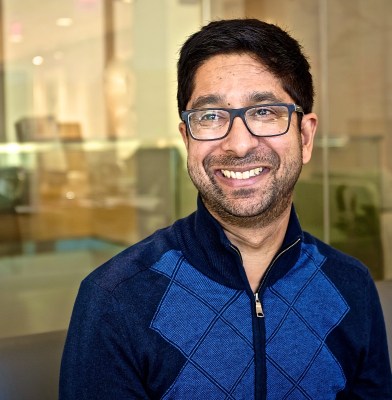Andreessen Horowitz is making a big move into biotech, and it’s using a $200 million new fund called the AH Bio Fund – and new general partner, Vijay Pande — to plant its stake in the ground.
The fund will be used to invest in mostly early-stage startups at the intersection of computer science and life sciences. It’s the first sector-focused fund for Andreessen Horowitz, which is halfway through its main fund, a $1.5 billion vehicle that it announced in March of last year.
Pande seems a good choice to lead it. He has the know-how and the connections, having spent the last 16 years teaching chemistry, structural biology and computer science at Stanford University, where he says he’ll continue “spending a very small percentage of my time” with his research group there.
Pande also knows startups, having been involved in a number of them already. Last year, for example, he cofounded Globavir, a seed-funded infectious disease company. Pande also founded Folding@home, a now 16-year-old distributed computing project for disease research that remains his highest-profile work to date.
Asked if it will be hard to say no to some of the many Stanford-related startups now working on health care-focused, machine-learning startups, Pande calls it a “kid in a candy store” issue, adding that he expects to “see a lot [of startups] from Stanford, Berkeley, and M.I.T.,” among other places. (Conveniently, he notes, he has spent time at all three. He was once a Miller Fellow at U.C. Berkeley and nabbed his PhD in physics from M.I.T.)
Andreessen Horowitz is quick to note that Pande won’t be making decisions about what to fund on his own.
While he might be the one “banging the table” about particular investments, decisions ultimately still flow through the group, says managing director Scott Kupor. “It’s more of a debate process,” he explains. A GP can get a deal done that isn’t widely embraced, but only after adequately addressing other partners’ concerns. If after “withstanding the questions and criticisms,” a partner is still arguing for why the strengths of a company outweigh its weaknesses, the firm will move forward, Kupor says.
Meanwhile, Pande – who began working with Andreessen Horowitz in a part-time capacity last year — says partner feedback is a large part of what attracted him to his new role. He talks about a “marketplace on the bio side” that general partner (and former OpenTable CEO) Jeff Jordan helped him vet. He mentions looking at a startup in the healthcare and insurance space with another fellow GP, Lars Dalgaard, who founded and long led the HR management software company SuccessFactors (acquired in 2011).
Whatever the process, one of those meetings has already turned into a first investment for Pande, who recently led an early round in TwoXAR, a company that’s using big data and proprietary algorithms to generate new drug candidates and assess the efficacy of existing therapeutics.
It sounds like we should expect many more to come. Pande says he finds three areas particularly interesting: digital therapeutics, so-called cloud biology, and computational medicine.
Pande’s appointment makes him the firm’s ninth general partner, following the recent hiring for TrialPay founder Alex Rampell in late August.
Pande would have been the tenth GP, but an earlier hire, Balaji Srinivasan, who was brought into the firm in December 2013, has since become the CEO of 21, a bitcoin company that he’d cofounded before joining the venture outfit. (Srinivasan was originally expected to play an advisory role to 21; Kupor says it was Srinivasan’s decision to instead join 21 in as its chief executive earlier year.)
As for the question of whether the partnership might hire a female partner at any point, Kupor stresses that 50 percent of the firm’s “senior management team” is made up of women and that the firm is “always looking for the best people” both internally and for its portfolio companies.
Asked whether new hires like Pande and Rampell suggest that a new fund is around the corner, Kupor insists one is not. “We haven’t made any decisions yet about when we’ll raise another [fund]. We literally haven’t even sat down to start thinking about it.”
